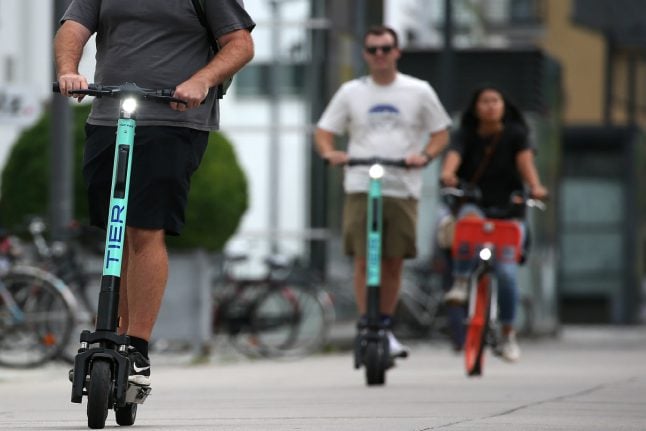Just over half of The Local readers say e-scooters in Germany are a “great” addition to the country’s mobility network.
That’s the result of a survey we conducted to find out readers' views on the introduction of electric scooters to cities across the country.
Thousands of e-scooters have been filling up Germany's streets since they were given the green light at the start of the summer. But there have been calls for tighter regulations – and even bans – over fears of ‘chaos’ amid rising injuries.
“E-scooters should be completely banned,” said Andreas Gassen, head of the National Association of Statutory Health Insurance Physicians (KBV), as The Local reported on Tuesday. “That’s the only thing that would help to avoid injuries,” he said. “From a medical point of view, they're just too dangerous, so get rid of them.”
Yet a majority – 52 percent – of respondents to our poll backed the vehicle's arrival in Germany, indicating that support is strong, while 16 percent said e-scooters are “alright”. Another 16 percent said they find e-scooters “quite annoying”.
How popular are e-scooters?
A total of 56 percent of The Local readers said they had used an electric scooter in Germany, while 16 percent said they hadn’t but would like to.
Nearly a quarter (24 percent) of people said they hadn’t tried one.
Some authorities have called for improved safety measures and controls to be put in place, such as designated parking zones and compulsory helmets.
READ ALSO: Parking bans and restricted zones: How German cities plan to crack down on e-scooters
Just under half (48 percent) of Local readers said that no one should be made to wear a helmet and that it should be an individual choice, while 36 percent said forcing riders to wear helmets would improve safety.
'Great addition to cities but there are problems'
When we asked if e-scooters are a good addition to your town or city, we had mixed responses.
The positive reactions ranged from people saying they were “awesome” and “super convenient”. Others said they could help in the fight against climate change.
“They make getting from A to B fun,” said Robert, 22, in Berlin.
READ ALSO: 'Improve cycling infrastructure': Can Germany cope with electric scooters?
Yet despite the support for the scooters, a lot of people said there were some teething problems.
“Great addition (to Germany) but the parking of them on pavements is certainly an issue,” said David, 42, from Berlin. “Also, some e-scooter users are dangerous to pedestrians on the pavement.”
 An e-scooter user being stopped by police in Stuttgart. Photo: DPA
An e-scooter user being stopped by police in Stuttgart. Photo: DPA
Jeremy, 29, in Berlin, added: “It's a good addition to help bring people to train stations, and it could help reduce short bus trips (it does for me at least).”
However, he added that rules need to be enforced to keep people off the pavement and to limit bad parking. “It might help to have docking stations like some bike sharing systems,” he said.
Ian, 38, also in Berlin, welcomes e-scooters “to the mix of transport options needed for us to move away from cars”.
Meanwhile, Mog, 42, in Berlin, said: “I personally find them annoying but if they encourage people away from driving and have environmental benefits I can put up with them.”
Are e-scooters safe?
Again, we received a real mix of comments relating to this issue, with most people saying safety could be improved upon.
Some respondents said the two wheelers were fun to use but also dangerous. Ecem, 28, in Berlin said they are risky because it's “almost impossible to give a turn signal while riding”.
Berlin-based Svetlana, 31, is firmly against them. She said: “E-scooters are dangerous for both riders and pedestrians.”
A lot of readers pointed out they thought e-scooter riders were more careless than other road users – and that was a problem.
READ ALSO: Should electric scooter riders in Germany be forced to wear helmets?
Marcelo, 25, in Berlin, “My biggest concern is that people do not relate e-scooters to bikes. If they were to follow the same rules it would be just fine.”
Pierre, 53, in Nuremberg, said he was surprised by how both cyclists and e-scooter riders seemed to take over pedestrian space.
“Many of them are quite aggressive and intimidating for walkers,” he said. “They should be in dedicated cycling lanes (on the roads) and not intermixed with pedestrians.”
Meanwhile, Omid, 37, in Berlin, called for “strict rules” for e-scooter riders who drive dangerously or park in the wrong place.
“There should be some heavy fines for all these situations,” he said.
Lena, 39, also in Berlin said she would like to see a ban on e-scooters, or legislation that ensures riders have a licence.
'Pricing is crazy'
Several people also pointed out that the cycling infrastructure in Germany can't cope with the additional vehicles in the network.
“Just like bikes, we need more parking places for bikes and e-scooters,” said Mo, 30, in Mannheim.
Some readers said Germany needed to think about reducing the space given to cars on the roads to allow for more bikes and scooters.
There were also a few comments on the price of renting an e-scooter, with lots of respondents saying it was very expensive. One respondent said they were using the e-scooters with a promo code but didn't think they'd use them without discount.
Roman, 32, in Munich, said overall he thought the introduction of e-scooters was a “great move” but added: “Pricing is still crazy.”
Thank you to our readers for helping us with this story



 Please whitelist us to continue reading.
Please whitelist us to continue reading.
Member comments